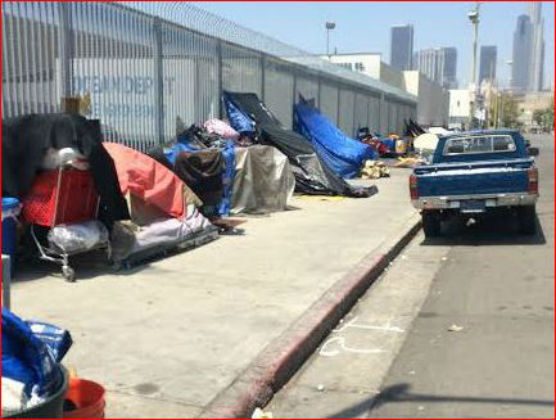Los Angeles County has opened 250 additional recuperative care beds this year, bringing the total to 432, a major milestone in the Measure H-funded Homeless Initiative.
The intiative’s goals include ending homelessness for tens of thousands of chronically homeless individuals and families, improving health outcomes, and reducing utilization of hospital emergency services.
The positive impact can be seen at the Martin Luther King, Jr. Medical Campus in South L.A. and other locations across the County where clients can convalesce after a hospital stay and get linked to social support services to forge new lives off the streets.
The MLK campus houses one of 12 recuperative care sites, run with a variety of partners, that provide transitional ‘respite’ care for homeless patients with complex health and behavioral health conditions who are discharged by County-run and private hospitals or exiting custody facilities. Oversight is handled by Housing for Health, a unit founded in 2012 within the County Department of Health Services.
The 100-bed MLK Recuperative Care Center, opened in January 2016, takes in about 600 homeless patients a year, reducing the costly overutilization of public hospitals, jails and first responders.
“The MLK Recuperative Care Center provides homeless patients with a place to heal and a path to recovery,” Supervisor Mark Ridley-Thomas said. “In addition to temporary housing, they receive round-the-clock care, including nursing, mental health counseling, substance abuse treatments, life skills classes, and other services to help them achieve stability and transition into permanent supportive housing.”
Other recuperative sites are in Metro and South Los Angeles, Long Beach, Sylmar and Bell. Provider partners include LAMP, JWCH, HealthRight 360, Christ-Centered Ministries and Serenity Recuperative Care. Clients stay four to 10 weeks on average.
The network is an essential linchpin in the care continuum to stabilize, support, and link clients to permanent supportive housing to break the cycle of long-term homelessness.
This short video goes inside one of the centers and introduces several clients who have benefitted from recuperative care and moved on to permanent housing with supportive services: https://vimeo.com/245765944.
Recuperative care facilities provide short-term medical care with case management to homeless individuals recovering from an acute illness or injury who no longer require hospitalization. They fill a critical gap between acute care and skilled nursing facilities by providing basic and imperative healthcare services like dressing changes and wound care — at a fraction of the cost of an acute care hospital bed.

Over the next 10 years, Measure H will bring more than $3 billion for homeless programs that include wrap-around supportive services for those living in independent housing, rental subsidies, street engagement teams, case management and homeless prevention efforts. Recuperative care is funded through several sources, including Measure H, which has funded the addition of 250 new beds this year.
L.A. County Health Agency director Mitchell Katz, M.D., says a step-down recuperative unit helps relieve a bottleneck that has plagued the County-run health system for years.
“Our hospitals are often hamstrung with no place to discharge homeless patients, necessitating that we hold up a bed for days when other patients truly need them,” Katz said. “Recuperative care improves outcomes, reduces emergency room utilization, and creates health system savings that more than offset by the costs of adding recuperative beds.”
A RAND Corporation three-year study found that Housing for Health initiatives, including recuperative care, saved taxpayers thousands of dollars by reducing hospitalizations and emergency room visits. Clients improved their mental health, and 96 percent remained in housing for more than a year, the study found.
As clients recover in recuperative care settings, case workers engage and link clients to transitional ‘bridge’ or permanent housing with supportive medical, substance abuse and behavioral health services that keep clients housed and medically managed.
Phil Ansell, director of the County’s Homeless Initiative, states “Recuperative care is a key area for allocation of Measure H funds. In partnership with nonprofits, business, faith and community leaders, the County will end homelessness for 45,000 families and individuals within five years, and through prevention strategies, to keep another 30,000 families and individuals housed who would otherwise have become homeless. “
About the L.A. County Department of Health Services
The Department of Health Services is an integrated health system dedicated to providing high-quality, patient-centered care. Through academic affiliations with the University of Southern California and the University of California, Los Angeles, DHS hospitals are training sites for resident physicians completing their graduate medical education in nearly every specialty and subspecialty. With the Departments of Mental Health and Public Health, DHS is part of the Los Angeles County Health Agency, which is focused on health initiatives that include development of housing and supportive services for the homeless, substance use disorder treatment, diversion of corrections populations, and reduction of hospital emergency department overcrowding, among other priorities. For more information on DHS programs and services, visit www.dhs.lacounty.gov.
About the L.A. County Homeless Initiative
Los Angeles County’s Homeless Initiative is a broad-based action plan with 51 interconnected strategies developed to combat and prevent homelessness. The plan was adopted by the Board of Supervisors in 2016 following an extensive public engagement process and represents the collaboration of the County with civic, community, municipal, business and faith-based organizations across the region in confronting this shared humanitarian crisis. The Homeless Initiative provides oversight and hands-on guidance to deploy the infusion of voter-generated Measure H funds for services and programs with rigorous accountability, and maximize the alignment and effectiveness of this unprecedented commitment. For more information, visit http://homeless.lacounty.gov/.
Like this:
Like Loading...
Related





 Tweet This
Tweet This Facebook
Facebook Digg This
Digg This Bookmark
Bookmark Stumble
Stumble RSS
RSS

























REAL NAMES ONLY: All posters must use their real individual or business name. This applies equally to Twitter account holders who use a nickname.
1 Comment
Well done, and intelligent.